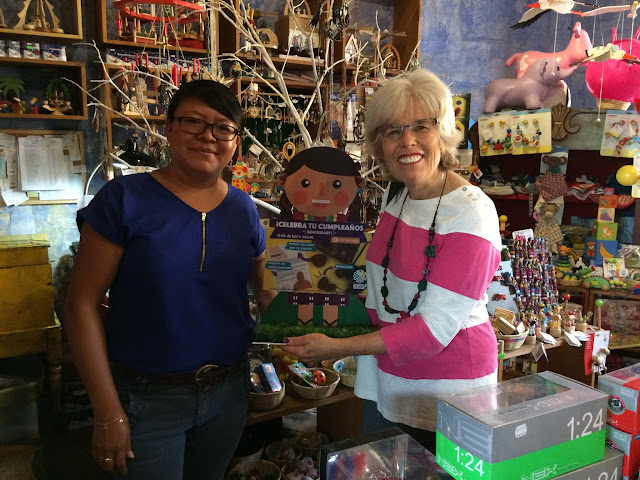Scaling the Sale of Educational Artisan Products in Guatemala
Written by F2F Volunteer Jo Anne Cohn
F2F volunteer Jo Anne Cohn
visiting a shop in
Antigua which carries DIDART kits
This month I had my first opportunity to work with
Farmer-to-Farmer and Partners of the Americas. My assignment was to assist DIDART, a small business which makes
educational kits for children in Guatemala. My task was to help staff members
develop a sales strategy in order to enter new markets for their craft
products.
First, let me tell you a little about the product. Each kit comes
with raw materials gathered by indigenous communities in Guatemala to make a
craft. In addition, each kit contains a “passport” with an App to download.
Once the App is downloaded, you can visit Guatemala electronically and learn
more about the country's diverse indigenous populations and how the raw materials are used to make artisan crafts. Out
of my kit which contained pine needles, I made a bracelet! Other kits include
manguey for making key chains, clay for making figures and seeds for making
masks.
Most of the DIDART kits sold in Guatemala are sold to schools. I
did have the opportunity to accompany the DIDART team on a sales call to the
Liceo Javier, in Guatemala City. In addition, we went to Antigua to visit local
shops where kits are being sold. DIDART is also teaming up with the private
sector in the area of social responsibility. The idea is for corporations to
buy kits to be used in underserved communities.
What I like about DIDART kits is that not only is it a great
learning tool for children, it helps out the local economy as well by buying
raw materials from more than 250 local artisans. There’s also an environmental
component to DIDART. They have teamed up with CBC (Central America Bottling
Corporation) to develop an application called “Ecounidos” where you can
determine the location of the recycling centers nearest to you.




.png)

Comments
Post a Comment